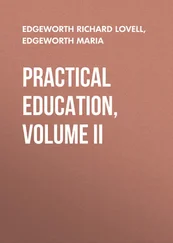Maria Edgeworth - Leonora
Здесь есть возможность читать онлайн «Maria Edgeworth - Leonora» — ознакомительный отрывок электронной книги совершенно бесплатно, а после прочтения отрывка купить полную версию. В некоторых случаях можно слушать аудио, скачать через торрент в формате fb2 и присутствует краткое содержание. Жанр: literature_19, foreign_antique, foreign_prose, на английском языке. Описание произведения, (предисловие) а так же отзывы посетителей доступны на портале библиотеки ЛибКат.
- Название:Leonora
- Автор:
- Жанр:
- Год:неизвестен
- ISBN:нет данных
- Рейтинг книги:4 / 5. Голосов: 1
-
Избранное:Добавить в избранное
- Отзывы:
-
Ваша оценка:
- 80
- 1
- 2
- 3
- 4
- 5
Leonora: краткое содержание, описание и аннотация
Предлагаем к чтению аннотацию, описание, краткое содержание или предисловие (зависит от того, что написал сам автор книги «Leonora»). Если вы не нашли необходимую информацию о книге — напишите в комментариях, мы постараемся отыскать её.
Leonora — читать онлайн ознакомительный отрывок
Ниже представлен текст книги, разбитый по страницам. Система сохранения места последней прочитанной страницы, позволяет с удобством читать онлайн бесплатно книгу «Leonora», без необходимости каждый раз заново искать на чём Вы остановились. Поставьте закладку, и сможете в любой момент перейти на страницу, на которой закончили чтение.
Интервал:
Закладка:
Well, my Gabrielle, my definitive opinion is that I can never love this friend of Leonora. I said that she had lived much in the world – but only in the English world: she has never seen any other; therefore, though quite in a different style from Leonora, she shocks me with the same nationality. All her ideas are exclusively English: she has what is called English good sense, and English humour, and English prejudices of all sorts , both masculine and feminine. She takes fire in defence of her country and of her sex; nay, sometimes blushes even to awkwardness, which one would not expect in the midst of her good breeding and vivacity. What a difference between her vivacity and that of my charming Gabrielle! as great as between the enlargement of your mind and the limited nature of her understanding. I tried her on various subjects, but found her intrenched in her own contracted notions. All new, or liberal, or sublime ideas in morality or metaphysics she either cannot seize, or seizes only to place in a ridiculous point of view: a certain sign of mediocrity. Adieu, my Gabrielle. I must send you the pictures, whether engaging or forbidding, of those with whom your Olivia is destined to pass her time. When I have no events to relate, still I must write to convey to you my sentiments. Alas! how imperfectly! – for I have interdicted myself the expression of those most interesting to my heart. Leonora, calmly prudent, coolly virtuous, knows not what it costs me to be faithful to this cruel promise. Write to me, my sympathizing, my tender friend!
Your ever unhappy Olivia.Letter xiv
Mrs C – to Miss B –
Some very good people, like some very fine pictures, are best at a distance. But Leonora is not one of these: the nearer you approach the better you like her, as in arabesque-work you may admire the beauty of the design even at a distance, but you cannot appreciate the delicacy of the execution till you examine it closely, and discover that every line is formed of grains of gold almost imperceptibly fine. I am glad that the "small sweet courtesies of life" have been hailed by one sentimental writer at least. The minor virtues are not to be despised even in comparison with the most exalted. The common rose, I have often thought, need not be ashamed of itself even in company with the finest exotics in a hothouse; and I remember, that your brother, in one of his letters, observed, that the common cock makes a very respectable figure even in the grand Parisian assembly of all the stuffed birds and beasts in the universe. It is a glorious thing to have a friend who will jump into a river, or down a precipice, to save one's life: but as I do not intend to tumble down precipices, or to throw myself into the water above half a dozen times, I would rather have for my friends persons who would not reserve their kindness wholly for these grand occasions, but who could condescend to make me happy every day, and all day long, even by actions not sufficiently sublime to be recorded in history or romance.
Do not infer from this that I think Leonora would hesitate to make great sacrifices. I have had sufficient experience of her fortitude and active courage of mind in the most trying circumstances, whilst many who talked more stoutly shrunk from committing themselves by actions.
Some maxim-maker says, that past misfortunes are good for nothing but to be forgotten. I am not of his opinion: I think that they are good to make us know our winter from our summer friends, and to make us feel for those who have sustained us in adversity that most pleasurable sensation of human mind – gratitude.
But I am straying unawares into the province of sentiment, where I am such a stranger that I shall inevitably lose my way, especially as I am too proud to take a guide. Lady Olivia **** may perhaps be very fond of Leonora: and as she has every possible cause to be so, it is but reasonable and charitable to suppose that she is: but I should never guess it by her manner. She speaks of her friendship sometimes in the most romantic style, but often makes observations upon the enviable coolness and imperturbability of Leonora's disposition , which convinces me that she does not understand it in the least. Those who do not really feel always pitch their expressions too high or too low, as deaf people bellow or speak in a whisper. But I may be mistaken in my suspicions of Olivia; for to do the lady justice , as Mrs Candour would say, she is so affected that it is difficult to know what she really feels. Those who put on rouge occasionally are suspected of wearing it constantly, and never have any credit for their natural colour; presently they become so accustomed to common rouge, that mistaking scarlet for pale pink, they persist in laying on more and more, till they are like nothing human.
Yours affectionately, Helen C – .Letter xv
Olivia to Madame de P –
I have found it! I have found it! dear Gabrielle, rejoice with me! I have solved the metaphysical problem, which perplexed me so cruelly, and now I am once more at peace with myself. I have discovered the reason why I cannot love Leonora as she merits to be loved – she has obliged me; and the nature of obligation is such, that it supposes superiority on one side, and consequently destroys the equality, the freedom, the ease, the charm of friendship. Gratitude weighs upon one's heart in proportion to the delicacy of its feelings. To minds of an ordinary sort it may be pleasurable, for with them it is sufficiently feeble to be calm; but in souls of a superior cast, it is a poignant, painful sensation, because it is too strong ever to be tranquil. In short —
"'Tis bliss but to a certain bound —
Beyond, 'tis agony."
For my own part, the very dread that I shall not be thought to express enough deprives me of the power to speak, or even to feel. Fear, you know, extinguishes affection; and of all fears the dread of not being sufficiently grateful operates the most powerfully. Thus sensibility destroys itself. – Gracious Heaven! teach me to moderate mine.
In the nature of the obligation with which Leonora has oppressed my heart, there is something peculiarly humiliating. Upon my return to this country I found the malignant genius of scandal bent upon destroying my reputation. You have no idea of the miserable force of prejudice which still prevails here. There are some women who emancipate themselves, but then unluckily they are not in sufficient numbers to keep each other in countenance in public. One would not choose to be confined to the society of people who cannot go to court, though sometimes they take the lead elsewhere. We are full half a century behind you in civilization; and your revolution has, I find, afforded all our stiffened moralists incontrovertible arguments against liberty of opinion or conduct in either sex.
I was thunderstruck when I saw the grave and repulsive faces of all my female acquaintance. At first I attributed everything that was strange and disagreeable to English reserve, of which I had retained a sufficiently formidable idea: but I presently found that there was some other cause which kept all these nice consciences at a distance from my atmosphere.
Would you believe it, I saw myself upon the point of being quite excluded from good society. Leonora saved me from this imminent danger. Voluntarily, and I must say nobly, if not gracefully, Leonora came forward in my defence. Vanquishing her natural English timidity, she braved the eyes, and tongues, and advice of all the prudes and old dowagers my enemies, amongst whom I may count the superannuated duchess her mother, the proudest dowager now living. When I appeared in public with a personage of Leonora's unblemished reputation, scandal, much against her will, was forced to be silent, and it was to be taken for granted that I was, in the language of prudery, perfectly innocent. Leonora, to be consistent in goodness, or to complete her triumph in the face of the world, invited me to accompany her to the country. – I have now been some weeks at this superb castle. Heaven is my witness that I came with a heart overflowing with affection; but the painful, the agonizing sense of humiliation mixed with my tenderest sentiments, and all became bitterness insufferable. O Gabrielle! you, and perhaps you alone upon earth, can understand my feelings. Adieu! – pity me – I must not ask you a single question about – I must not write the name for ever dear – What am I saying? where are my promises? – Adieu! – Adieu!
Читать дальшеИнтервал:
Закладка:
Похожие книги на «Leonora»
Представляем Вашему вниманию похожие книги на «Leonora» списком для выбора. Мы отобрали схожую по названию и смыслу литературу в надежде предоставить читателям больше вариантов отыскать новые, интересные, ещё непрочитанные произведения.
Обсуждение, отзывы о книге «Leonora» и просто собственные мнения читателей. Оставьте ваши комментарии, напишите, что Вы думаете о произведении, его смысле или главных героях. Укажите что конкретно понравилось, а что нет, и почему Вы так считаете.












